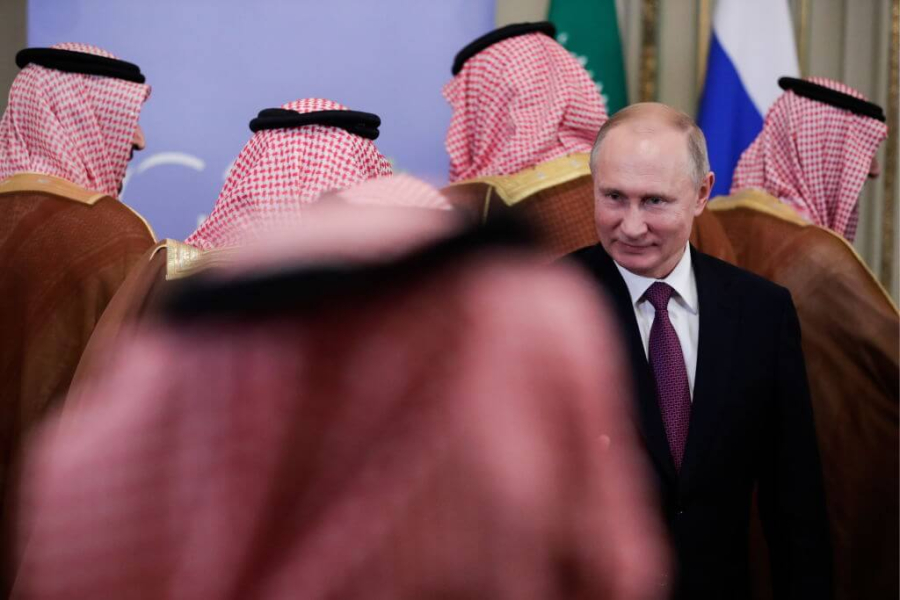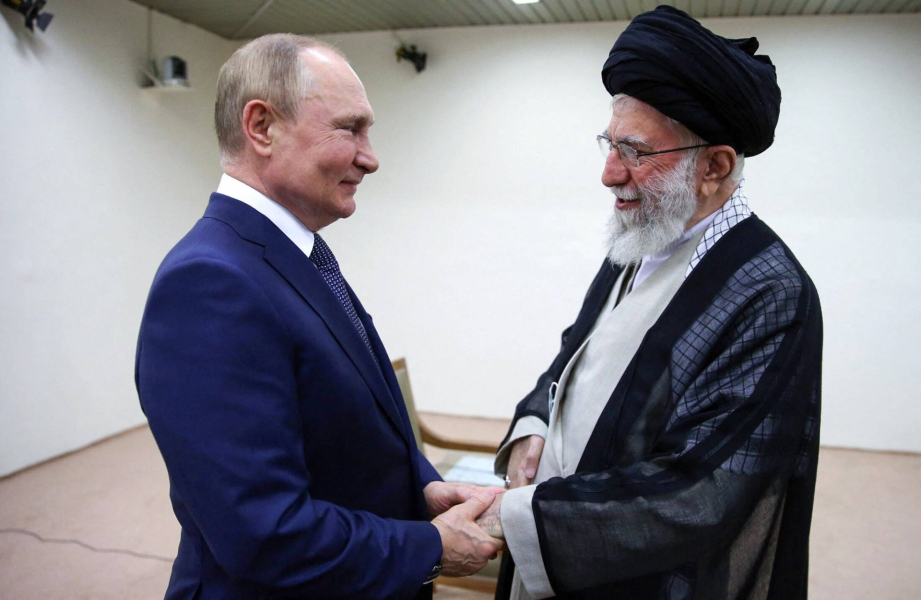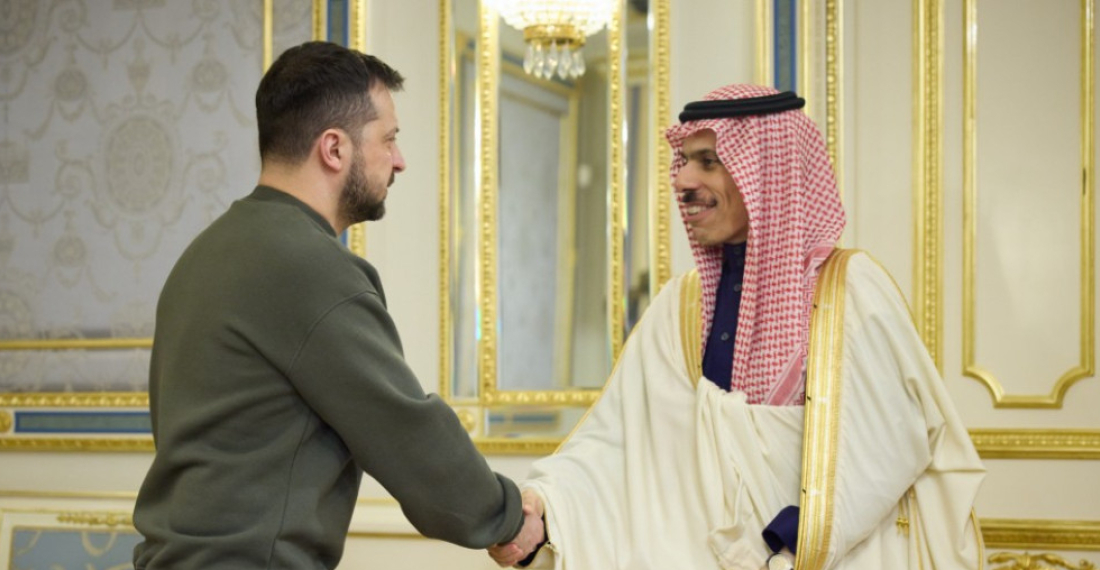When Russia launched its full-scale invasion of Ukraine one year ago the prevalent feeling among the Arab Gulf states was that they did not want to get involved.
Some thought the best policy was to ignore it, others that they should at the very least dodge it, and some even saw in it some opportunity to extend relations with Russia and China.
There were a number of reasons for this. The region was frustrated with how the west dealt with it. It expected a more equal relationship that never properly materialised. There was fatigue at western attempts – some clearly ill-judged – at interfering in the Arab region, and conversely, disappointment at western failure to stand up to Iran. The unsightly US departure from Afghanistan, and talk of American strategic re-positioning, convinced some that the American moment in the Gulf had passed.
The EU was not taken seriously and individual European states, such as the UK, France and Germany seemed to treat the Gulf as a petrol station and an arms bazaar. It was therefore time to seek new pastures: co-operation with Russia on energy, nuclear power and space; with China on trade and investment, and generally with the global south on everything.
Of course, as always in such circumstances, the reality was much more nuanced, and things did not turn out as either Mr Putin, or others, had expected.
The war in Ukraine has snapped the west out of its collective international inertia. What the world has seen, to the surprise of some and the horror of others, is the G7 countries, NATO and the EU all of a sudden acting in concert, unleashing a barrage of sanctions against Russia, providing an extraordinary package of financial and military assistance to Ukraine, and reappraising their global posture.
Not only that, rather than dealing with issues episodically, as has often been the case in the last decades, the west appeared to have a long term commitment to a holistic approach to ensure that the outcome of the Russia-Ukraine war is not one that gives Vladimir Putin either victory or succour. In response, over the last year, the position of the Arab Gulf monarchies to the Ukraine issue has evolved. It continues to do so.
The slow evolution of Arab Gulf monarchies' position to the Ukraine issue
On the first anniversary of the Russian full-scale invasion, all six GCC countries voted in favour of a resolution condemning Russia in the UN General Assembly. This has generally been the pattern, except that right at the start of the crisis the UAE, currently a non-permanent member of the UN Security Council, abstained on a vote condemning the Russian invasion, to the horror of western countries. The Emiratis had to be talked through the seriousness of the situation, and why a balanced approach in these circumstances was counter-productive.
In April all six GCC countries abstained in a vote to suspend Russia from the UN Human Rights Council. Initially some GCC countries said they wanted to be seen as non-committal in order to be able to help in brokering a peace process, or at least in intervening on some humanitarian issues, as indeed happened on several occasions. But this aloofness appears to be softening.

The region has also up to now not been particularly supportive of the Ukrainian war effort. This also appears to be changing. On Sunday, Saudi Foreign Minister, Prince Faisal bin Farhan, was in Kyiv where he met President Zelensky and presided over the signing of agreements providing 400 million USD in humanitarian and other assistance to Ukraine. Crown Prince Mohamed bin Salman spoke to Zelensky on the phone a few days earlier. The Kingdom still preferred to characterise the financial package as a humanitarian rather than a political gesture, but the size of the package indicated this was not just a symbolic act.
Perhaps even more significantly, public opinion in the Gulf states on the matter is also evolving. A year ago, some were openly expressing themselves in media and on social media that Europe was finally tasting its own medicine by experiencing war on its own continent, instead of inflicting it on others. Opinions are now more rational, and there is increased sympathy for the struggle of the Ukrainian people to defend their homeland.
Three reasons why the Gulf's approach to the Russia-Ukraine war has evolved
So what brought about this change? Some say it was mainly arm-twisting by Washington. There was, it is true, a bit of that, but it was largely ineffective, if not counter-productive. Instead, three factors have contributed to the evolution in the position of the Arab Gulf states, and continue to do so:
First is the realisation that for the collective west, Ukraine is not just another “adventure” but an existential issue. That has made Gulf capitals think very seriously about any position that they take since despite their posturing none want to break their relationship with the west;
Second, there is a greater awareness of the unjustness of the Russian invasion. Gulf countries are very sensitive to the issue of sovereignty and territorial integrity of states. The memory of how one of them, Kuwait, was swallowed up by a larger neighbouring country in 1990, and the effort it took to undo that, is still raw;
Third, but not least, the role of Iran and the military strategic partnership that appears to be developing between Moscow and Tehran has set alarm bells ringing right across the region. GCC countries have set themselves big ambitions for the next decade or two. Change is taking place at supersonic speed on many fronts as the region prepares itself for the post-oil era. But Iran remains the elephant in the room, and all efforts can easily end up in flames in case of a conflagration with Iran.
Iran’s international isolation had so far kept it within bounds, but the Russia-Ukraine war threatens to replace that with a strategic partnership between Tehran and Moscow that can embolden Iranian radicals.

The European Union needs to be much more engaged, much more focused, and much more innovative in the way it engages with the region
So, as the Russian full-scale invasion of Ukraine enters its second year, the position of the GCC countries is not static but continues to evolve. They are trying to carve a space for manoeuvre, keeping as many options open as possible, but making sure that in the end the region remains on the right side of history. In this situation the need for constant political, diplomatic and intellectual engagement between the west and the GCC countries is absolutely essential.
Here the European Union needs to be much more engaged, much more focused, and much more innovative in the way it engages with the region. But if GCC countries also want a relationship with Europe based on a sounder, more equitable basis, they too must see that the present crisis offers an opportunity to do just that, and they also should be looking at better ways to engage.






